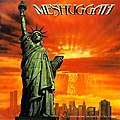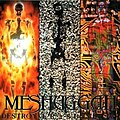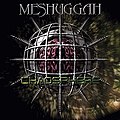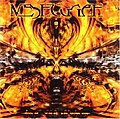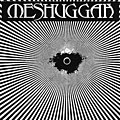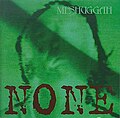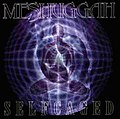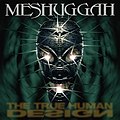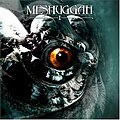Meshuggah
Meshuggah |
|---|
Meshuggah, whose name is derived from the Yiddish word for "crazy", is a five-piece tech metal band from Umeå, Sweden who use extended polymetric passages, complex drum patterns, odd time signatures, angular, dissonant guitar riffs, and harsh, monotonal vocals.
Band history
Meshuggah was formed in Umeå in 1987; two years later, the band released their first record, an EP entitled Psykisk Testbild (which can be roughly translated as "psychic test picture" (see test card). This recording displayed a straightforward thrash metal influenced sound, with some strains along the lines of Metallica's concurrent releases. There were also hints of more complex music in the songwriting. As the group grew older, they further refined the technicality of their musicianship and songwriting. This led to a harsher sound, utilizing strong seven string guitar (and later eight string guitar) rhythms, manic sounding vocals, and a combination of jazz fusion elements as well. This caused the band's style to border on the lines of an esoteric feel.
While the band's music is extremely intense and aggressive, the members often demonstrate a strong sense of humour: their video for "New Millennium Cyanide Christ" consisted of the five band members sitting inside their tour bus headbanging and air guitaring to the song. Promotional photos of the band often include comical grimacing.
In late 2005, Meshuggah were nominated for a Swedish Grammy for the album Catch Thirty-Three.
In a recent interview with Toazted, Mårten Hagström revealed that Meshuggah are currently working on material for a new album, which is scheduled for a May 2007 release.[1] However, in a recent post on Meshuggah's official website, the band stated they were shooting for a September 2007 release.
Influences
Bands such as Dream Theater, God Forbid[2], Deftones, Lamb of God, 10 Years and Tool have cited Meshuggah as an influence.
In the insert booklet of Destroy Erase Improve, the band note such musical influences as Metallica, Cynic, Death, Slayer, Megadeth, Tori Amos, Björk, Steely Dan, Earth Wind and Fire, Primus and Mike Oldfield.
Current members
- Jens Kidman - Lead vocals
- Fredrik Thordendal - Lead/Rhythm guitar, backup vocals
- Mårten Hagström - Rhythm guitar, backup vocals
- Dick Lövgren - Bass
- Tomas Haake - Drums
Style
Among the band's most recognizable qualities are lead guitar player Fredrik Thordendal's abrasive, chaotic and dischordant solos, singer Jens Kidman's vocals, which resemble manic screams and shouts; the churning, dissonant rhythm guitars and the polymetric drum beats. In a typical Meshuggah song, drummer Tomas Haake plays two separate rhythms: a standard 4/4 beat with his hands, and a completely different metrical subdivision with his feet. The guitar riffs drive the bass drum work, creating an awkward but pulsating rhythmic pattern to work as the basis of the song.
To give an example, the main riff of the song "New Millennium Cyanide Christ" from their 1998 album Chaosphere follows the aforementioned blueprint. Haake beats a rather slow 4/4 rhythm with his hands, while the bass drums and guitars play a repetitive 23/16 rhythm pattern on top of it. As the subdivided pattern is repeated, the pattern's accents shift to different beats on each repetition. After repeating the 23/16 pattern five times, a shorter 13/16 pattern is played once. These patterns sum up to 128 16th notes, which equals exactly 8 measures in 4/4 meter.
The band has evolved through a number of stylisitic periods. Contradictions Collapse and None have a sound similar to Metallica's concurrent albums. Destroy Erase Improve and Chaosphere have a more distinct off-time influence along with the thrash metal sound. Nothing and Catch Thirty-Three have a sound close to the vein of groove metal, consisting of droning and slow grooves.
While live drums were obviously not abandoned, an unusual decision was made to use programmed drum patterns using Toontrack's "Drumkit From Hell" (developed in co-operation with Tomas Haake and Morgan Ågren) sample library on the latest album Catch Thirty-Three, not only providing a more precise and mechanized drumscape, but also making drum beat creativity a more collaborative effort amongst all of the band members. It cemented the album as one of the band's most complex works to date. The band members have, however, stated in several interviews that the decision to use programmed drums was due to the lack of time given by their label to produce the record.
On their latest records (I, the re-release of Nothing and Catch Thirty-Three), guitarists Thordendal and Hagström use custom-made Nevborn, and custom Ibanez eight string guitars. These guitars add two low strings to allow the crushing, heavy riffs to be played in even lower registers. They currently use Line 6's Vetta II Amps
Lyrical Themes
In regards to lyrics, the main lyricist of Meshuggah is drummer Tomas Haake, who uses vocabulary and metaphorical styling. Through abstract descriptions, Haake tackles such topics as: The self, society, mendaciousness, the human condition, and spatial/4th dimensional concepts. While Haake tends to write the majority of the lyrics, guitarist Mårten Hagstrom also contributes to certain songs.
Discography
Albums
-
Contradictions Collapse
(1991)
Nuclear Blast -
Destroy Erase Improve
(1995)
Nuclear Blast -
Chaosphere
(1998)
Nuclear Blast -
Nothing
#165 US Billboard 200
(2002)
Nuclear Blast -
Catch Thirty-Three
#170 US Billboard 200
(2005)
Nuclear Blast -
Nothing Re-release with DVD
(2006)
Nuclear Blast
EPs
-
Psykisk Testbild
(1989)
Garageland record store -
None
(1994)
Nuclear Blast -
Selfcaged
(1995)
Nuclear Blast -
The True Human Design
(1997)
Nuclear Blast -
I
(2004)
Fractured Transmitter Records
Compilations
-
Rare Trax
(2001)
Nuclear Blast
Trivia
- In 2005 they produced a remix of Rammstein's track "Benzin".
- A music video exists for the song "New Millennium Cyanide Christ" that takes place on the Meshuggah tour bus, and showcases rampant headbanging, air drumming, Jens Kidman using a red ballpoint as a fake microphone and Fredrik Thordendal's impressive air guitar skills. The video can be found on the Rare Trax CD or on the DVD portion of the 2006 special edition/re-issue of Nothing (also can be found on YouTube or Google Video).
- Meshuggah is the favorite metal band of Steven Wilson of Porcupine Tree and Blackfield fame and co-producer of several albums by the Swedish progressive death metal band Opeth.
- As stated in interviews, Meshuggah is the favorite band of Stephen Carpenter of the Deftones.
- Jack Osbourne has cited Meshuggah as a favorite band. Their song "Soul Burn" was played in an episode of the MTV reality series The Osbournes, in which Jack blasted it out his window in an attempt to aggravate his neighbors (but labeled the band mistakenly as "death metal from Norway").
- Progressive rock band Tool have said that they have taken a lot of influence from Meshuggah for their newest album 10,000 Days. Guitarist Adam Jones: "I see a lot of them in us and us in them."
- Progressive metal band Dream Theater named a section in their instrumental "The Dance of Eternity" the "Meshuggah riff" as part of their policy of giving names to parts of complex songs in order to more easily remember them.
References
- ^ ""AUDIO (MP3) INTERVIEW WITH MARTEN FROM MESHUGGAH (2006)"". "Toazted". Retrieved 2006-11-19.
- ^ Interview With God Forbid

